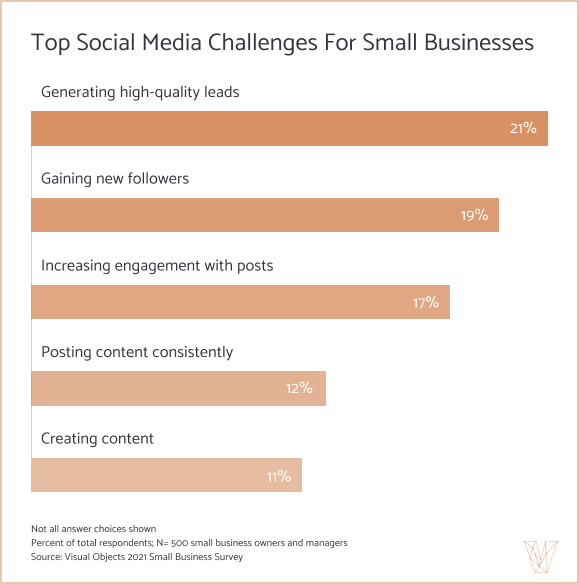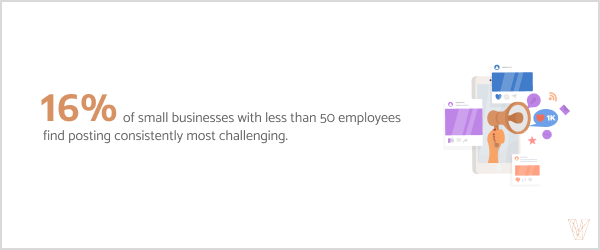Most small businesses encounter the same critical social media challenges. Companies must adapt to unique features across social platforms and best leverage their marketing resources to execute a cross-channel strategy.
The majority of small businesses continue to invest time and resources in marketing on social media. Most small businesses engage with followers at least weekly across various social platforms.
However, turning awareness into conversions is easier said than done Despite small business engagement on social media, less than half of marketers believe that social media generates a return on investment (ROI).
Conversions aside, many small businesses struggle to secure a following and raise brand awareness on social platforms.
While small businesses encounter various social media challenges, many are confronted with similar obstacles and can collectively learn from these challenges.
Visual Objects surveyed 500 small business owners and managers to determine the most prevalent social media challenges in the current market, seeking to facilitate solutions and learning.
Our Findings
- Almost all small businesses (93%) struggle with social media challenges, indicating nuanced challenges and best practices across different social platforms.
- On Instagram, small businesses (19%) most commonly struggle with gaining new engaged followers, emphasizing a need for a compelling content strategy.
- On LinkedIn, generating high-quality leads challenges 32% of small businesses, pointing to unique barriers in the B2B social environment.
- On TikTok, 17% of small businesses experience difficulties creating content as they continue to acclimate to the rapidly-growing platform.
- Businesses with fewer employees (16%) struggle to establish a consistent posting cadence, which a software solution could aid.
Assuming Social Media Challenges Are Straightforward
The vast majority of small businesses admit to facing at least one major challenge with their social media performance.
While social media platforms may seem like a straightforward, approachable medium for marketing, nuances across platforms can compound into prevalent social media challenges.
Currently, 93% of small businesses experience a major social media challenge in their marketing work.

The most commonly cited social media challenges are generating high-quality leads (21%), gaining new followers (19%), increasing audience engagement (17%), posting content (12%) consistently, and creating content (11%).
Meagan Morris, a senior SEO strategist at Hurrdat Marketing, discusses important factors to consider before making a post, illustrating social media marketing’s complicated nature.
“As we all know, being present on social media is important for a business, but I always say quality over quantity,” Morris said. “There are also some factors to think of before you just send out a post.”
Morris recommends small businesses consider the following questions before sending out a social media post:
- Does the post support your broader business goals?
- Does the content’s messaging match your brand?
- Is the content engaging and relevant?
- Can you include an eye-catching graphic or video?
- Which platform is this post the best fit for?
- Are you posting consistently and maintaining an active presence?
Social media marketing is more complicated than it sounds, especially for small businesses with fixed resources. Almost all small businesses face a major social media challenge and should plan their cross-channel strategy with prevalent difficulties in mind.
Connecting and Engaging With Instagram Followers
Instagram allows companies to showcase their products visually and compete with larger brands, but small businesses have trouble gaining new followers and boosting engagement on the platform.
Finding new followers and engaging them with content are the most significant challenges for 19% of small businesses on Instagram.

Instagram offers businesses opportunities for success but requires companies to effectively apply their brand identity and voice to their content to cultivate their audience.
Finding the right voice, tone, and graphics for your audience can seem like a guessing game, but the answers may already exist on your profile.
Sharon Mills, the lead publicist at BySBM, recommends that small businesses use engagement metrics on past posts to their advantage.
“Small businesses should be focusing on their engagement rates for each post and not for their overall accounts,” Mills said. “Pay attention to which types of posts get the most engagement and focus on creating more content like that.”
“Pay attention to which types of posts get the most engagement and focus on creating more content like that.”
Small businesses can gain insights into what kind of content resonates with their audience by leaning on content types that have performed well in the past. Once you find the right content niche and stick to it, you can foster a consistent brand voice and visual aesthetic on the platform that will attract new followers.
Instagram can be crowded and complicated for small businesses, especially those looking for followers and engagement. However, companies can cater to their growing audiences by critically examining their highest performing content to inspire new posts.
Generating Leads On LinkedIn
LinkedIn offers a unique, business-focused social media network for small businesses to connect and grow with other professionals. However, small businesses find it challenging to generate leads based on their LinkedIn activity.
Nearly one-third of small businesses that use LinkedIn (32%) find that generating qualified leads is their most significant social media challenge.

Visual Objects found that generating qualified leads is the most common social media challenge across platforms, but the most severe problem exists on LinkedIn.
Many experts find LinkedIn to be the perfect place for generating business connections, relationships, and leads. Why don’t small businesses feel that way?
LinkedIn conversion strategy may be distinctly challenging to small businesses because of the platform’s B2B nature. As a result, companies can’t replicate their Facebook and Instagram strategy on LinkedIn for success. LinkedIn requires a different approach.
For instance, engagement metrics may feel hugely important on consumer-driven channels. However, they may not be a priority for LinkedIn. Digital marketing agencies suggest companies seeking conversions should pay the closest attention to conversion metrics rather than engagement metrics.
Jackie Kossoff, a marketing and design consultant, warns small businesses to avoid prioritizing engagement over generating high-quality leads across any social platform.
“Too often, I see businesses focusing on engagement at the expense of profits and ROI,” Kossoff said. “Especially when it comes to paid advertising, it's common for businesses with low engagement to have incredible returns.”
“Too often, I see businesses focusing on engagement at the expense of profits and ROI.”
Small businesses shouldn’t prioritize engagement above their bottom line. Generating leads on unique platforms like LinkedIn will be more attainable to those focusing on conversions and ROI.
Creating Content On TikTok
TikTok may be rising in popularity among social media users, but small businesses are still acclimating to creating content on the video-sharing platform.
Currently, 17% of small businesses that use TikTok believe creating content is their most prominent social media challenge.

Established in 2016, TikTok has been described as the ‘wild west’ of social media marketing. The relatively new platform is driven by a young user base and rapidly changing trends, making for a more unpredictable marketing environment.
Some consumer brands have experienced success in marketing on TikTok, many relying on their appeal with younger audiences.
Even if your company can position itself on TikTok, you still need to create compelling video content that aligns with current trends.
Crystal Statskey, OBM and Visibility Strategist, agrees that creating video content is a widespread social media challenge among small businesses.
“If your small business is wanting to market to the younger generation, TikTok is where it's at,” Statskey said. “Video takes more work than just writing a blog post, so I can see that being an issue for many small businesses that don't have the time.”
"Video takes more work than just writing a blog post, so I can see that being an issue for many small businesses that don't have the time.”
For companies with limited resources, Statskey suggests outsourcing projects to video production companies. That way, creating content on TikTok becomes more manageable for small businesses looking to experiment with the platform.
Posting Consistently With Limited Resources
Small businesses with smaller staffs struggle most with posting content according to a consistent cadence.
Small businesses with fewer than 50 employees (16%) find it more difficult to post actively on social media platforms than their larger competitors.

Many small businesses have limited resources to devote to social media marketing. Posting consistently becomes a problem for employees juggling multiple responsibilities along with social media.
Social media consultants recommend making it easier on marketing employees by introducing a social media management software such as Hootsuite. These software systems provide the following benefits to small businesses:
- Community management
- Post scheduling
- Analytics and reporting
Fewer than one-third of small businesses currently use social media software. Still, Meranda Vieyra of Denver Legal Marketing believes automation programs are essential to a well-executed social media strategy.
“Smart businesses automate their social media through programs like Hootsuite,” Vieyra said. “It allows them to maintain a consistent presence on social media even when they are busy, distracted, etc.”
A social media management software will keep your posts on a schedule, even if your employees work on other core business goals. Management software systems will guarantee that making consistent posts isn’t one of your social media challenges.
Address Social Media Challenges With A Measured Response
Social media challenges affect almost all small businesses.
The most common social media challenges in the current landscape are:
- Underestimating the complexities of social media
- Finding and engaging Instagram followers
- Generating high-quality leads on LinkedIn
- Creating TikTok content
- Posting consistently with fixed resources
Companies can avoid the negative consequences of common social media challenges by amending their strategies to account for best practices.
About the Survey
Visual Objects surveyed 500 small business owners and managers at companies in the U.S. with fewer than 500 employees in December 2020.
Fifty-three percent (53%) of respondents are female; 47% are male.
Twenty-six percent (26%) are 18 to 34; 50% are 35 to 54; 24% are 55 or over.
Seven percent (7%) of respondents’ businesses have 1 employee; 36% have 2 to 10
employees; 25% have 11 to 50 employees; 18% have 51 to 250 employees; 15% have 251 to 500 employees.
Respondents are from the South (35%), Northeast (23%), West (22%), and Midwest (20%).